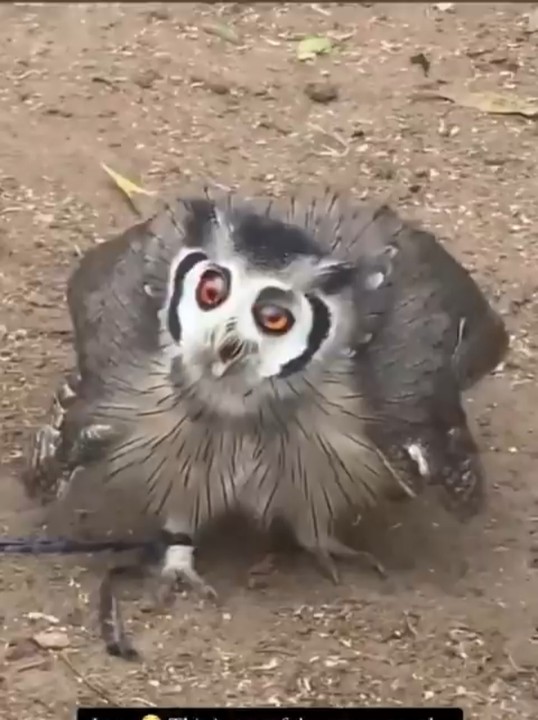There was drama in a Nigerian village recently after a man raised alarm about the sudden appearance of a strange bird in his family compound overnight. The incident, which was captured in a video shared on social media, quickly went viral and sparked a heated debate online.
According to the man, who was visiting his grandmother in the village, the bird entered their compound late at night. He described it as an “evil bird” and said he believed its presence was spiritual and suspicious.
“This is one of the reasons people don’t usually like going to the village. We came home to visit grandma, and this evil bird entered our compound overnight. Thank God I was awake to tie the bird down. Our pastor must see this. No weapon formed against me shall prosper.”
The video shows the bird tied by the leg in the compound, struggling to break free. In the background, the man can be heard praying and speaking in a worried tone. Several users online quickly identified the bird as an owl—a nocturnal creature often misunderstood in African communities.
In many Nigerian and African cultures, owls are often associated with witchcraft or bad omens. Some people believe that their appearance at night signals a spiritual attack, death, or a visit by witches. This belief is especially strong in rural areas, where traditional spirituality still plays a major role in people’s everyday lives.
In contrast, in many Western cultures and modern science, owls are seen as harmless birds that help control pests by feeding on rats and insects. They are even regarded as symbols of wisdom in Greek mythology.
This clash of beliefs became evident in the online conversation that followed the man’s post.
The video quickly gained traction on X, attracting thousands of views and mixed reactions from Nigerians both at home and abroad.
Some users sympathised with the man, admitting they too would have been scared if they found such a bird in their compound late at night.
“I don’t care what science says. If I see an owl by 2 a.m. in the village, I’m calling every pastor I know,” one user wrote.
Another added, “Whether good or bad, that bird is not supposed to be there. There’s no such thing as coincidence in the village.”
However, others criticised the man for tying up the bird and for spreading fear based on what they described as superstition.
One user responded, “This is an owl. It’s not evil, it’s not a witch. It’s just a bird that came out to hunt at night. Please let it go.”
Another tweeted, “These beliefs are why people still kill innocent animals. The man should have just let the bird fly away.”
Several wildlife experts have used the opportunity to educate the public. Speaking to our reporter, Dr. Yetunde Akinwale, a zoologist and wildlife conservationist, said owls are not harmful and pose no spiritual threat.
“Owls are nocturnal birds. That means they are active at night. They feed on rats, lizards, and insects. They are actually good for the environment, especially in rural areas where rodent control is important,” she explained.
Dr. Akinwale advised people to stop harming or killing owls out of fear. “We need more public education to correct these beliefs. Owls are not agents of witchcraft. They are part of our ecosystem.”
Despite the explanations, some residents in rural communities continue to hold strong spiritual beliefs around animals like owls, cats, and bats. In some churches, people are advised to pray and fast after such sightings.
In a phone conversation with our reporter, Pastor James Adefemi of a Pentecostal church in Ogun State said it’s always wise to pray when something unusual happens.
“Even if the bird is natural, the timing and location may have spiritual meaning. It’s always best to take it to God in prayer. The devil can use anything,” he said.
While the debate continues, many online users have called for balance—encouraging people to respect local beliefs while also promoting scientific understanding.
“Instead of mocking villagers for their beliefs, we should try to educate and help them understand the natural world,” a user wrote. “But we must also not dismiss their fear as foolishness. Belief systems are deeply rooted.”
For now, the fate of the tied owl remains unknown, but the conversation it started continues across social media.
As Nigeria continues to grow and modernise, the clash between traditional beliefs and modern science is likely to remain a hot topic—especially when it involves unusual events, mysterious animals, and rural life.

